Science
(www.olympiadsuccess.com)
Chapter 14. Electric Current and its Effects
Class VII
NCERT Questions
Question 1
Draw in your notebook the symbols to represent the following components of electrical circuits: connecting wires, switch in the ‘OFF’ position, bulb, cell, switch in the ‘ON’ position, and battery
Answer 1
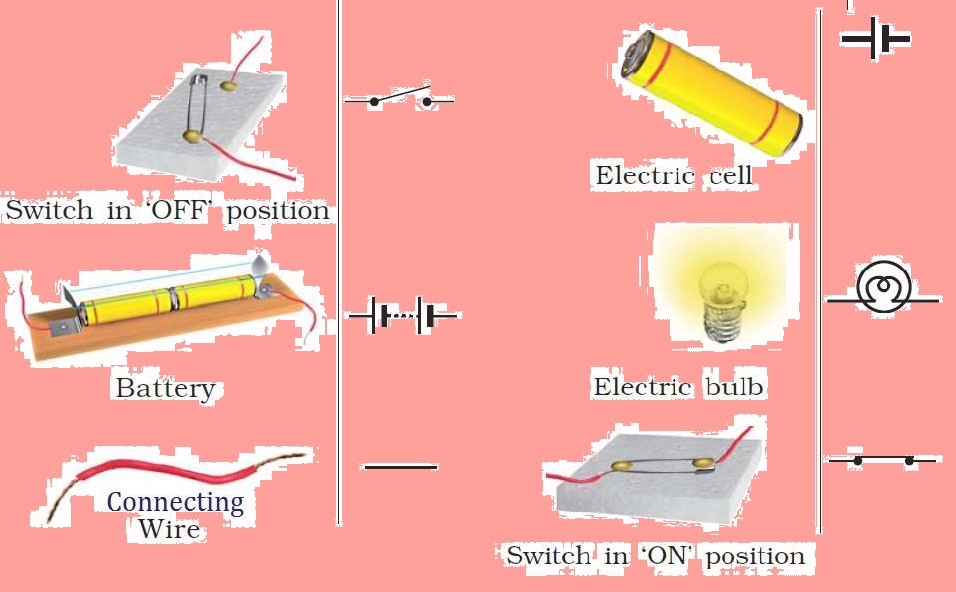
Question 2
Draw the circuit diagram to represent the circuit shown in Fig.14.21.
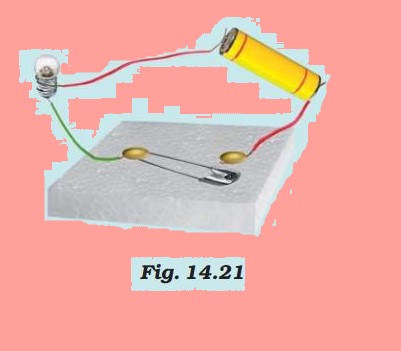
Answer 2
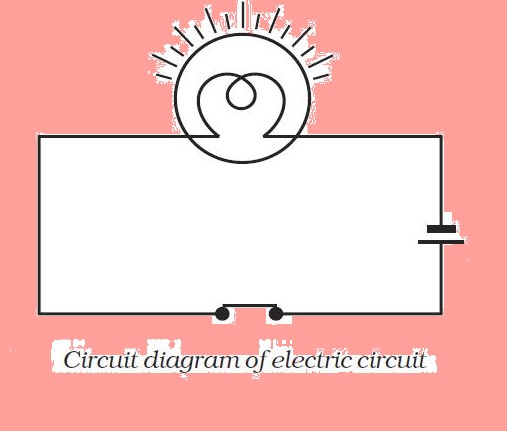
Question 3
Fig.14.22 shows four cells fixed on a board. Draw lines to indicate how you will connect their terminals with wires to make a battery of four cells.
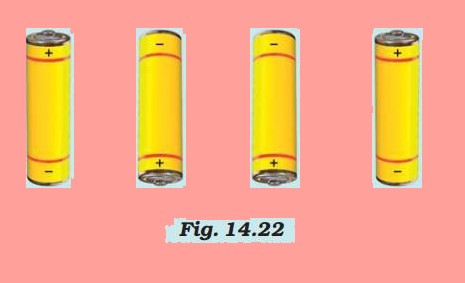
Answer 3
To make a battery of cells, the positive terminal (+) of one cell always be connected to negative terminal (-) of another cell.
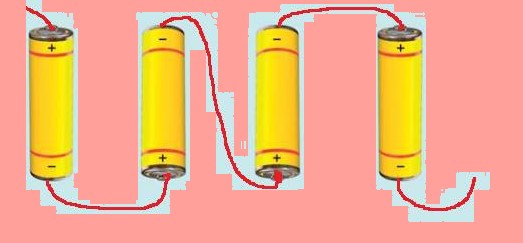
Question 4
The bulb in the circuit shown in Fig.14.23 does not glow. Can you identify the problem? Make necessary changes in the circuit to make the bulb glow.
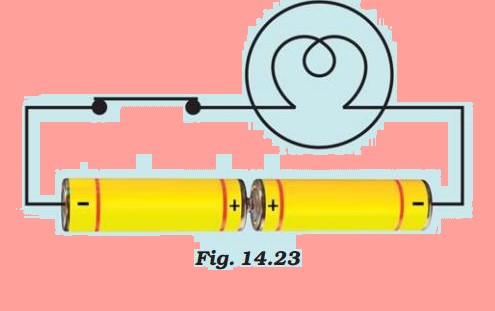
Answer 4
The positive terminal (+) of one cell always be connected to negative terminal (-) of another cell. Here the two positive terminals are connected to each other. The correct arrangement is as follows:
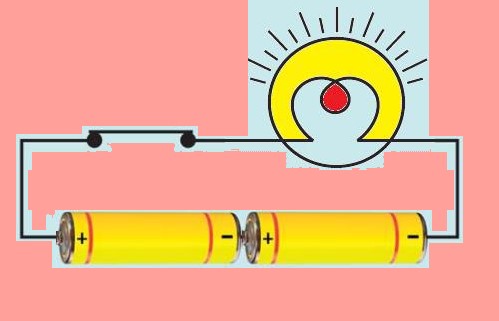
Question 5
Name any two effects of electric current.
Answer 5
Heating Effect of current: When an electric current passes through a wire, the wire gets heated. This is known as the heating effect of current. Which is used in many heating applications like electric heater, electric ion, light bulb etc. Magnetic Effect of current: When an electric current flows through a wire, it generates magnetic field around it. This effect is called magnetic effect of current. Magnetic Effect of electric current has many applications like power lift, electric bell, electric fan etc.
Question 6
When the current is switched on through a wire, a compass needle kept nearby gets deflected from its north-south position. Explain.
Answer 6
The current carrying wire produces magnetic field around it. When a compass is kept nearby this wire, the two magnetic field (magnetic field due to wire and magnetic field due to compass) interact each other causing deflection in magnetic needle. When the current is switched off, there is no magnetic field produced by the wire, magnetic needle does not deflect from its north-south position.
Question 7
Will the compass needle show deflection when the switch in the circuit shown by Fig.14.24 is closed?
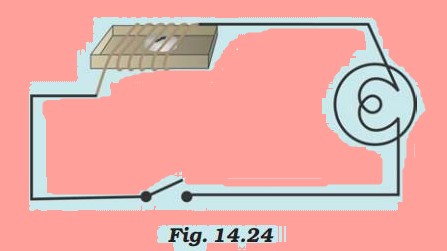
Answer 7
No, the compass needle will not show deflection even though the switch is closed, because there is no source of electric current (Battery or cell). An electric cell or battery needs to be connected here. In the absence of electric current, there is no magnetic field produced by the wires. Hence there is no deflection.
Question 8
Fill in the blanks: (a) Longer line in the symbol for a cell represents its ____________ terminal. (b) The combination of two or more cells is called a ____________. (c) When current is switched ‘on’ in a room heater, it ____________. (d) The safety device based on the heating effect of electric current is called a ____________.
Answer 8
(a) Longer line in the symbol for a cell represents its positive terminal. (b) The combination of two or more cells is called a battery. (c) When current is switched ‘on’ in a room heater, it becomes hot. (d) The safety device based on the heating effect of electric current is called a fuse.
Question 9
Mark ‘T’ if the statement is true and ‘F’ if it is false: (a) To make a battery of two cells, the negative terminal of one cell is connected to the negative terminal of the other cell. (T/F) (b) When the electric current through the fuse exceeds a certain limit, the fuse wire melts and breaks. (T/F) (c) An electromagnet does not attract a piece of iron. (T/F) (d) An electric bell has an electromagnet. (T/F)
Answer 9
(a) To make a battery of two cells, the negative terminal of one cell is connected to the negative terminal of the other cell. (F) (b) When the electric current through the fuse exceeds a certain limit, the fuse wire melts and breaks. (T) (c) An electromagnet does not attract a piece of iron. (F) (d) An electric bell has an electromagnet. (T)
Question 10
Do you think an electromagnet can be used for separating plastic bags from a garbage heap? Explain.
Answer 10
An electromagnet is just like as a bar magnet and it can attract iron pieces only. Plastic does not have any magnetic property, so electromagnet cannot be used to separate plastic bags from garbage heap.
Question 11
An electrician is carrying out some repairs in your house. He wants to replace a fuse by a piece of wire. Would you agree? Give reasons for your response.
Answer 11
Fuse is a device that is a safeguard to all of our electrical appliances. They are made up of special material which melt quickly and break when a large electric currents passed through it. If the electrician does not use proper fuse wire, instead he uses any ordinary electric wire as fuse, it increases the risk of overheating of wires due to flow of excessive current. It may lead to short circuit in electric equipment and these appliances may catch fire. It is advised to use standard fuse wire or MCBs to prevent electrical accidents.
Question 12
Zubeda made an electric circuit using a cell holder, a switch and a bulb. When she put the switch in the ‘ON’ position, the bulb did not glow. Help Zubeda in identifying the possible defects in the circuit.
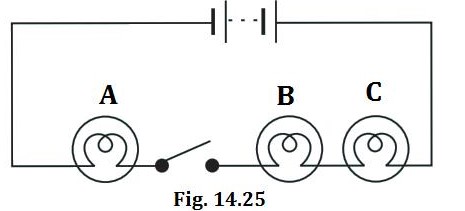
Answer 12
Possible reasons are as follows:
The bulb may be fused or defective.
Cells are not connected properly.
There may be loose connections.
The switch is not functioning well.
The cells are dried up i.e. the power of the cell has been exhausted.
Question 13
In the circuit shown in Fig. 14.25
Answer 13
(i) None of the bulb will glow when the witch is in the OFF position, since the electric circuit is not closed. (ii) When the switch is moved to 'ON' position, circuit is complete and electric curre nt will flow immediately. All of the bulbs will glow instantly.
Yearlong program for Olympiads preparation & to build necessary skills for future.
Explore More
Time to mark your calendar with the upcoming Olympiads exam schedule.
Explore More
Take your Olympiad preparation to next-level by taking LIVE Classes.
Explore More
Assess your performance by taking topic-wise and full length mock tests.
Explore More
Online tuitions for international compeitions like SASMO, SEAMO, etc for Grades 1-11.
Explore More